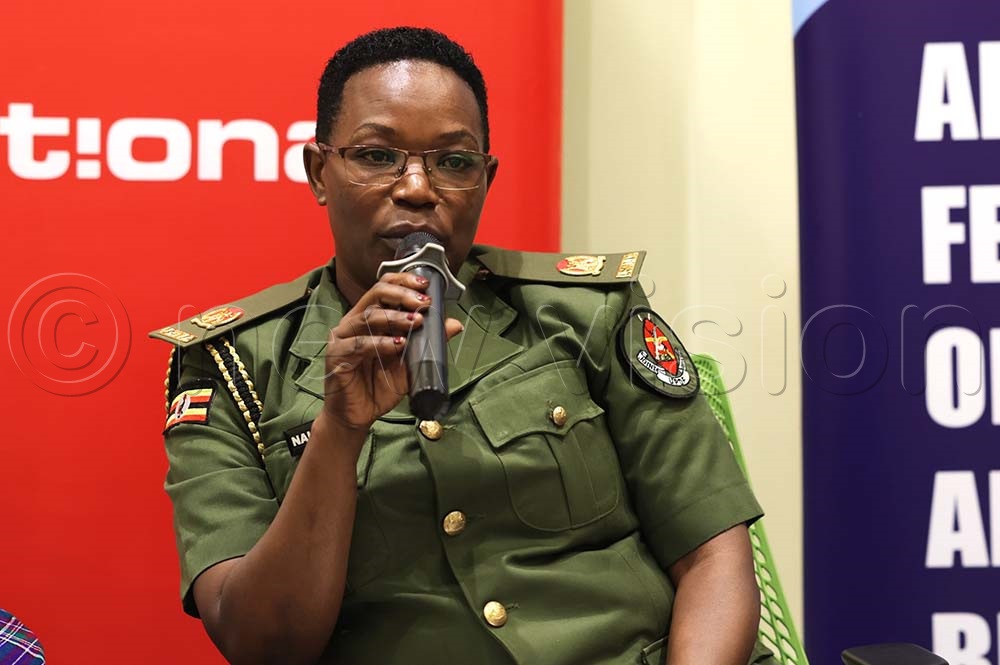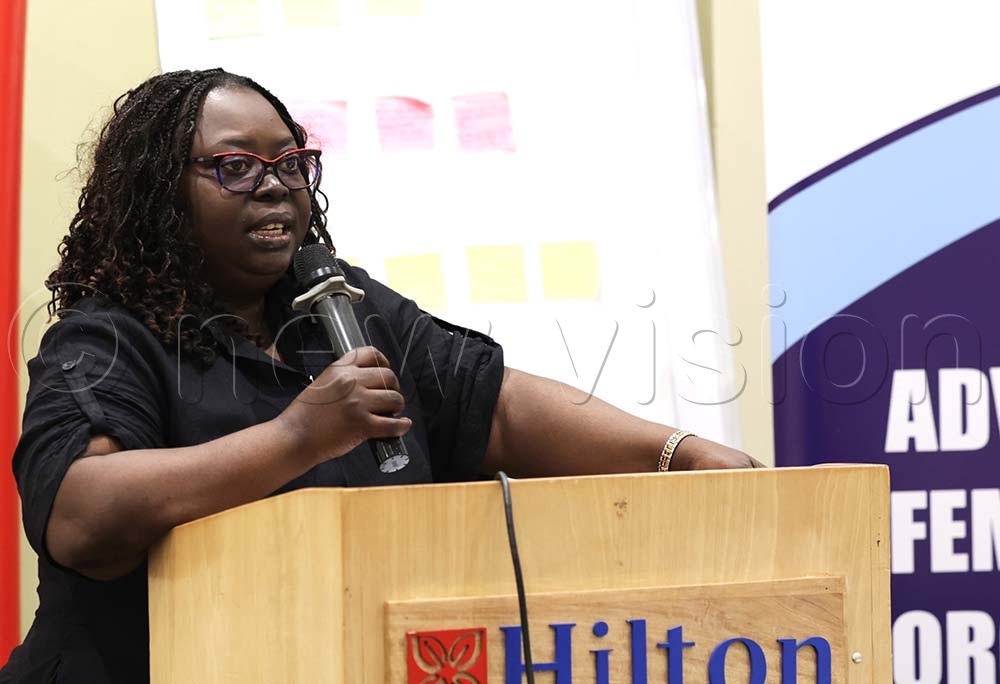Women activists propose reforms to end political bribery, violence and systematic exclusion
“If someone goes to court and it is proven that they engaged in electoral violence or bribery, they should never be allowed to run for office again,” Kiiza asserted.
Winnie Kiiza speaking during a panel discussion at the meeting. (Credit: Jeff Andrew Lule)
KAMPALA - As Uganda edges closer to its 2026 general elections, women leaders and civil society activists are calling for far-reaching electoral reforms to combat political bribery, violence and systemic exclusion.
They warn that without taking decisive action, the nation risks deepening democratic erosion.
At the Women, Peace and Security (WPS) meeting, at Hilton Garden Inn in Kampala city, former Leader of the Opposition in Parliament Winnie Kiiza, called on the Government to develop a law banning all individuals found guilty of election-related bribery and violence from holding public office or participating in future elections.
“If someone goes to court and it is proven that they engaged in electoral violence or bribery, they should never be allowed to run for office again,” Kiiza asserted.
“Right now, they bribe, they beat people, the election is annulled, and they come back to do it again. Many people have died because of this impunity, it must stop if we are to build a Uganda for all,” she noted.
Her comments come amid growing concerns of monetisation of elections, which she argues are making political spaces inaccessible, especially for women, many of whom are economically disadvantaged.
Kiiza emphasised that good governance must involve every citizen, regardless of gender or socioeconomic status.
But she noted that women continue to be sidelined due to persistent structural, economic and cultural barriers.
She stressed that in most homes, women are caregivers and during civic education broadcasts, they are in kitchens cooking or hospitals taking care of their loved ones, not in front of TVs or radios. She said because of this many are lagging behind on governance issues.
“Many are also intimidated by spouses. Some are even told who to vote for, regardless of personal choice,” she said.
Maj. Jacquelyn Nakayenze from the UPDF Gender Unit speaking at the event. (Credit: Jeff Andrew Lule)
Engage voters in civic education early
She called on institutions such as the Uganda Human Rights Commission (UHRC) and Electoral Commission (EC) to launch early voter and civic education, particularly targeting rural women and marginalized groups.
Reflecting on Uganda’s recent electoral cycles, Kiiza pointed to the escalating violence during intra-party primaries, such as those recently held by the ruling National Resistance Movement (NRM), as a warning sign of what may unfold in 2026.
“If party primaries are this violent, what will happen during general elections involving multiple political parties?” she asked.
Because of this, many women who want to participate in politics are discouraged by their families, fearing for their lives and safety.
She said the Uganda Police Annual Crime Report (2020) recorded more than 300 cases of election-related violence, most of them involving women, while a subsequent 2021 report placed that number at over 500 victims.
“We need deterrents that bite,” said Kiiza.
She called for strengthening the law, which protects voters and punishes offenders, not just with fines, but real political consequences.
Women peace and security is critical
The event also marked a critical reflection on Uganda’s National Action Plan III (NAP III 2020–2025) on WPS, which is yet to end.
Ritah Aciro Lakor, executive director of the Uganda Women’s Network (UWONET), said the WPS agenda remains a crucial pathway toward peace, inclusion, and accountability, but its implementation is falling short.
“You cannot talk about peace and security without involving women. At the heart of NAP III is a vision of a more peaceful and inclusive Uganda, one where women are not merely survivors of conflict, but powerful agents of change, mediators, and leaders,” she added.
They also raised concerns around shrinking civic space, limited access to HIV medication, and the exclusion of women with disabilities from peace and governance efforts.

The UWONET Executive Director Ritah Aciro, speaking at the meeting. (Credit: Jeff Andrew Lule)
Aciro said, these challenges, coupled with displacement, climate change, and entrenched gender norms, continue to marginalize women further.
She said they need to collectively evaluate progress, shape advocacy around NAP III’s final phase, and position women’s voices at the core of the upcoming NAP IV strategy.
Address the gaps
Emmanuel Omen, Acting Programmes and Fundraising Officer at ActionAid International Uganda (AAIU), emphasized that addressing these gaps is not just about equity, but about building sustainable peace.
“Research shows peace agreements are 35% more likely to last at least 15 years when women are involved. Yet women continue to be sidelined from key processes,” he said.
Albert Mwesigwa, a consultant, while presenting the NAP III issues paper, highlighted the legacy of women in Uganda’s peacebuilding history, from Betty Bigombe’s pivotal role in Northern Uganda’s reconciliation during the Lord Resistance Army (LRA) war, to Acholi, Lango, and Teso women who convinced relatives in the LRA to lay down their arms.
He stressed that research shows that women's organizations increase the chances of peace process success by up to 64%, a proof that inclusion of women works.
During a panel on emerging WPS priorities, Maj. Jacquelyn Nakayenze of the UPDF Gender Unit highlighted the growing role of women in command, special operations, and peacekeeping missions.
“Women are present, but their numbers are still low compared to men,” she noted.
She urged targeted recruitment, gender-sensitive training, and greater visibility for pioneers like Brig. Gen. Charity Bainababo, Col. Edith Nakalema, and Gen. Proscovia Nalweyiso.
She said women understand the challenges other women face the barriers they need.